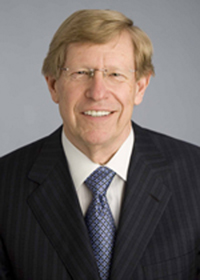Hearing Monday on release of Prop 8 videotapes

Ted Olson
But even before the August 29 hearing takes place on whether to release to the public videotapes of the landmark trial challenging California’s same-sex marriage ban—Proposition 8—there has already been decision to prohibit the recording of the hearing on whether to release the trial videotapes.
Such has been the Proposition 8 trial—Perry v. Brown (formerly known as Perry v. Schwarzenegger). It is a court battle so contentious it has already involved 34 judges and the filing of over a thousand documents, said Chad Griffin. Griffin is head of the American Foundation for Equal Rights, an organization formed specifically to finance the legal challenge to Proposition 8.
That legal challenge has included not only a three-week long trial, in January 2010, that led to a U.S. District Court ruling that Proposition is unconstitutional. It has included an unsuccessful motion from Yes on 8 attorneys seeking to forever sequester the videotapes of that trial from public view. And, in the next few weeks, it will include a hearing in the California Supreme Court to determine whether Yes on 8 has authority under any state law to press an appeal of the District Court decision in a federal appeals court, and it will include the hearing Monday in the U.S. District Court in San Francisco on AFER attorneys’ motion to have videotapes of the 2010 trial made publically available
On Thursday, August 25, U.S. District Court Chief Judge James Ware—who succeed the previous Chief Judge Vaughn Walker in February—granted a request by Yes on 8 attorneys to bar recording of the upcoming August 29 hearing to make the trial videotapes public.
Ted Boutrous, one of the lead attorneys for plaintiffs challenging Proposition 8, said in a phone conference call with reporters Thursday that he finds an irony in Yes on 8’s request to bar recording of the upcoming hearing.
“They want to hide the fact that they want to hide what happened in the trial,” said Boutrous.
Ted Olson, lead attorney on the AFER legal team, said he believes Yes on 8 attorneys are reluctant to let members of the public “see with their own eyes and hear with their own ears” how Yes on 8’s two witnesses gave testimony that undermined Yes on 8’s position.
Olson said support for the release of the videotapes is “grounded in the First Amendment” and in the traditions of the nation’s courts to provide open proceedings.
Judge Walker, who presided over the 2010 trial, initially sought to have the proceedings broadcast live in various federal courthouses around the country. But Yes on 8 attorneys quickly appealed that ruling and eventually won a ruling from the U.S. Supreme Court. The high court prohibited Walker from making a videotape or broadcast of the proceedings available beyond the San Francisco federal courthouse itself.
But Walker did videotape the trial himself, saying he wanted to use the videotapes for his own use in preparing the decision in the case. Walker also allowed AFER’s legal team to use clips from the videotape in preparing their closing arguments.
When Walker aired a clip from the videotapes himself before a live audience to which he was lecturing about the broadcast of public trials, Yes on 8 filed its motion seeking to sequester all tapes. Judge Ware, in June, denied that motion and Yes on 8 has appealed his decision to the 9th Circuit.
The 9th Circuit will rule on the matter of Yes on 8’s standing, after it receives an advisory opinion from the California Supreme Court. If both courts agree that Yes on 8 has legal standing to appeal even though the governor and state attorney general have chosen not to appeal, the 9th Circuit will also have to rule on the constitutionality of Proposition 8.
Boutrous will be representing the AFER legal team on Monday in the videotape release hearing. Olson will be representing the team on September 6 in the California Supreme Court hearing concerning Yes on 8’s legal standing.
Charles Cooper, the lead attorney for Yes on 8, said attorney David Thompson would present their team’s argument in favor of barring release of the videotapes.
AFER’s Griffin noted that a new play based on the written transcript of the Proposition 8 trial will premiere on Broadway next month and serve as a fundraiser for the continued legal challenge against Proposition 8.


I just can’t understand why the Prop 8 Trial was not allowed to be shown during the trial and further why the video is not released to the general public. This was a public hearing and should be available for the public. This proposition is known worldwide and people want to see the process and experience the entire trial in order to understand exactly how the decision was made. Is this no longer a free country? Why do you suppose that the Supporters of Proposition 8 are so afraid of having the trial made available to the general public? Seriously…..the answer to that question is pretty simple. There are thousands of people having their lives put on hold while Prop 8 bounces around like a rubber ball. This is simply wrong on so many levels and at least they deserve to see and hear the proceedings which influence their lives and family. The polls show that marriage equality is quickly moving to full-on approval from the majority. How many more insults must these people endure before it is done! The California Supreme Court has already ruled that to deny marriage to same sex couples is unconstitutional. Stop jacking these folks around and SHOW THE TRIAL.